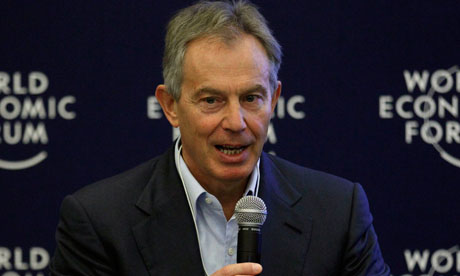Blair says leak of Palestine papers 'destabilising' for peace process
Former prime minister, now Middle East peace envoy, says intention of leak 'was to be extremely damaging'

Tony Blair said the leak of the Palestine papers was 'destabilising' and had damaged the peace process. Photograph: Vincent Kessler/Reuters
Tony Blair today accused those responsible for the leak of vast numbers of papers about talks between the Palestinians and the Israelis of wanting to seriously damage the peace process.
The former prime minister – now a Middle East peace envoy – said the release of the confidential documents prepared by Palestinian negotiators had been "destablising".
But, in an interview on BBC Radio 4's Today programme, he urged the Palestinians to ignore the damage caused and press ahead with the drive for peace.
Thousands of pages of Palestinian documents covering more than a decade of negotiations withIsrael and the US were obtained by al-Jazeera television and shared exclusively with the Guardian.
The papers revealed that Palestinian negotiators were willing to go much further in offering concessions than their people realised.
Asked how much damage the leaks had caused, Blair told Today: "I think it's hard to tell right now, but its intention was to be extremely damaging.
"I think, amongst Palestinians, it is slightly less hyper than it is elsewhere in the region. Most people, when they sit back and think about it, you would expect people to be negotiating, to be putting forward positions, taking them back."
Blair said he knew from his experience in Northern Ireland how damaging leaks of this kind could be.
"We could not have done the Northern Ireland peace process if, the entire time, [information] was being put out there with a pretty severe spin on it. So I think it is destabilising for the Palestinians," he added.
But he also said the Palestinians should not let the leak undermine the peace process. "I think we've just got to be big enough and strong enough to say, OK, whatever al-Jazeera are putting out, we're going to get on with making peace," he said.
In the interview, Blair also said Egypt should "evolve and modernise", but in a way that ensured stability.
"The challenges have been the same for these countries for a long period of time," he added. "The question is how they evolve and modernise, but do so with stability. The danger is [that] if you open up a vacuum, anything can happen.
"All over that region, there is essentially one issue, which is how do they evolve and modernise, both in terms of their economy, their society and their politics.
"All I'm saying is that, in the case of Egypt and in the case in Yemen, because there are other factors in this – not least those who would use any vacuum in order to foment extremism – that you do this in what I would call a stable and ordered way."
Blair said the west should engage with countries such as Egypt in the process of change "so that you weren't left with what is actually the most dangerous problem in the Middle East, which is that an elite that has an open minded attitude but it's out of touch with popular opinion, and popular opinion that can often – because it has not been given popular expression in its politics – end up frankly with the wrong idea and a closed idea."
